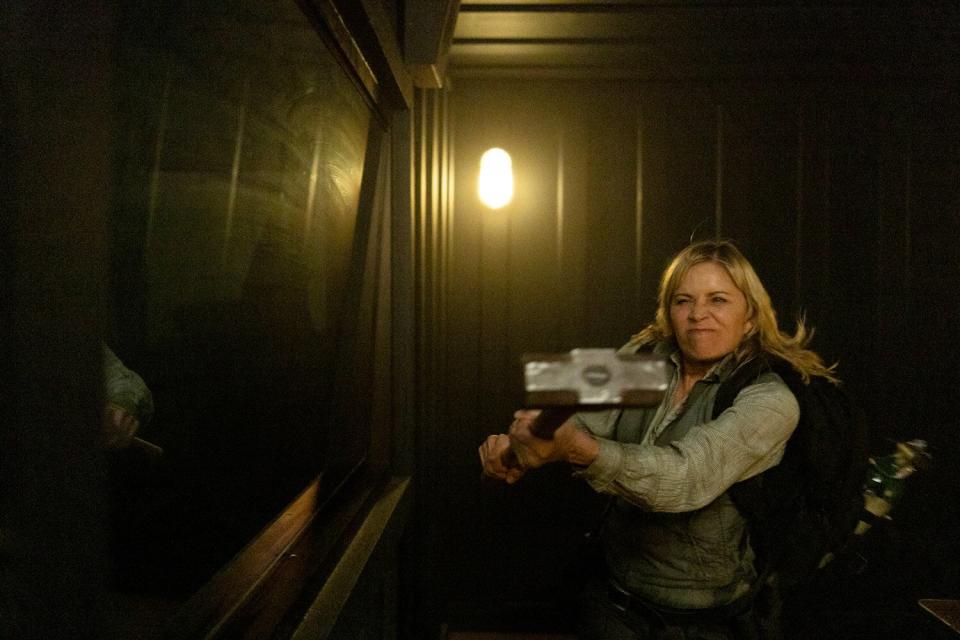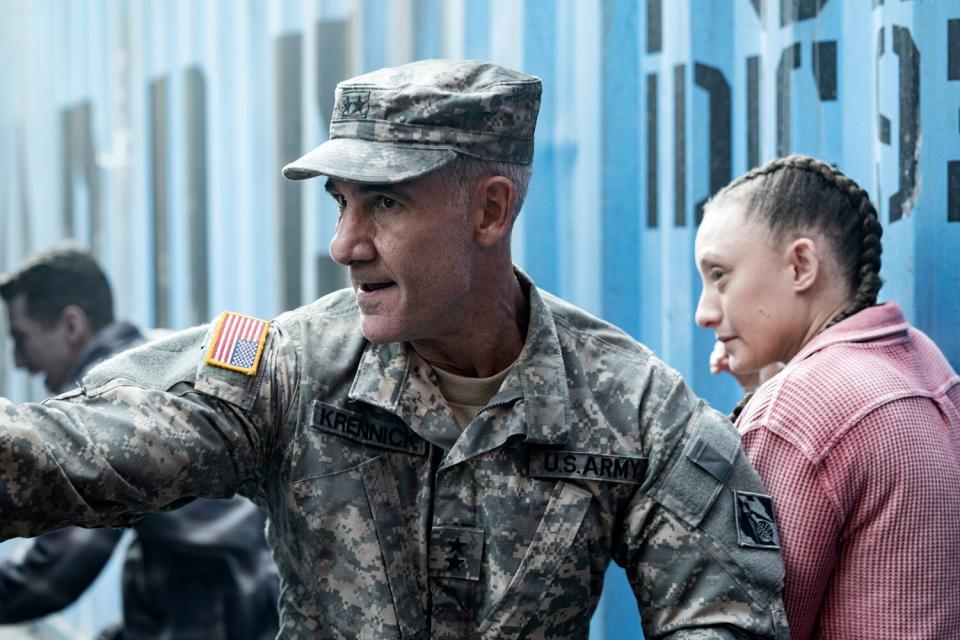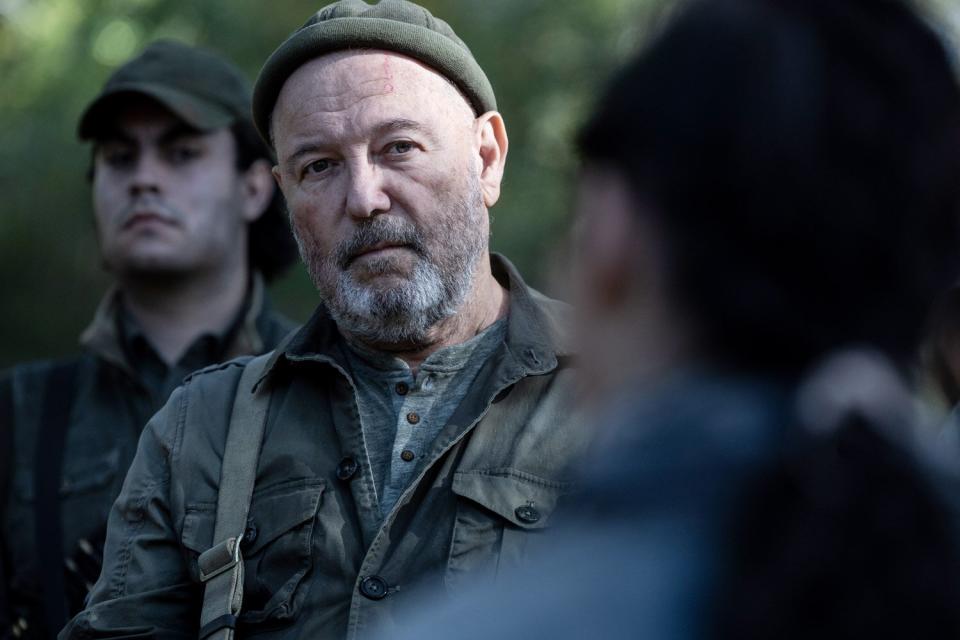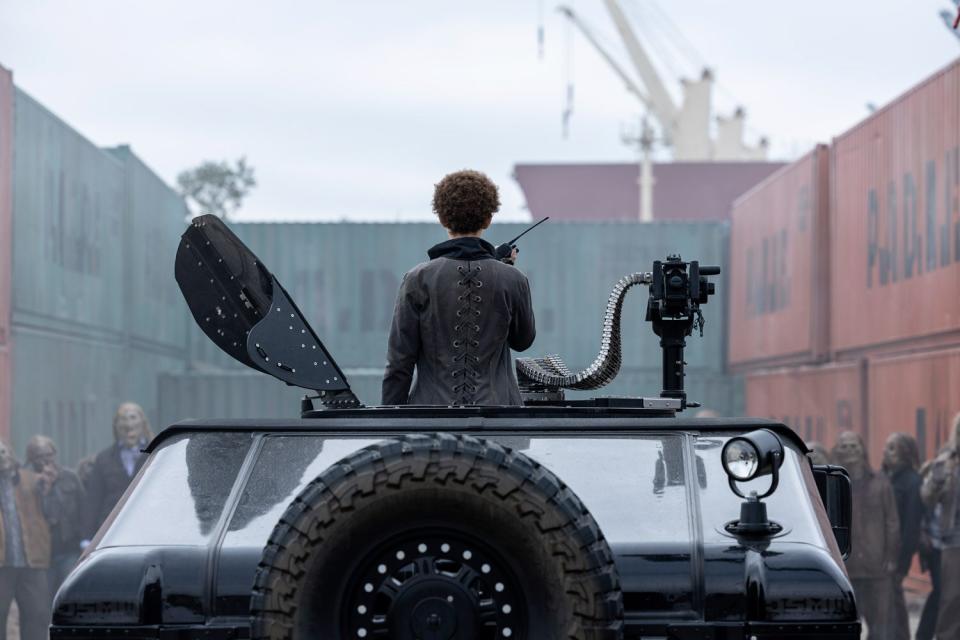Fear the Walking Dead showrunners explain that big flashback twist
- Oops!Something went wrong.Please try again later.
- Oops!Something went wrong.Please try again later.
Warning: This article contains spoilers for Fear the Walking Dead, season 8, episode 3, "Odessa."
Madison Clark finally learned the identity of the man behind the curtain… or, in this case, the one-way glass.
On Sunday's episode of Fear the Walking Dead, Madison (Kim Dickens) shattered the glass of the interrogation room only to discover it was not Shrike's father or some other adult running PADRE, but rather her brother Crane.
We also learned through flashbacks how PADRE became what it is, as we saw a teenage Shrike and Crane (then Sam and Ben) lose their father, who sacrificed himself to save his children. That trauma caused the siblings to set up a new system where children would never have to go through the pain of losing a parent again… although kidnapping them from their actual parents does seem like an odd way to go about it.
The episode also marked the return of Daniel Salazar (Rubén Blades) — who showed up leading a group of parents ready to battle to get their children back — and ended with an ominous look at thousands of walkers shuffling about a shipyard, seemingly as protection for a pier full of shipping crates. But why?
EW spoke with showrunners Andrew Chambliss and Ian Goldberg before the WGA writers' strike to get their thoughts on those important flashbacks, Daniel's new role, and that big ending.

Lauren "Lo" Smith/AMC Kim Dickens on 'Fear the Walking Dead'
ENTERTAINMENT WEEKLY: Let's talk about the big flashbacks and big reveal as you tell the story of Shrike and Crane — or Sam and Ben, as they were known in a previous life. When and how did you all end up with this story of these two children and what they went through and how it led them to where they are?
ANDREW CHAMBLISS: We've spent all this time building PADRE as being anti-family [and] trying to use the apocalypse to hit a reset switch so that they could wipe away the things that we've seen on seasons of The Walking Dead or seasons of Fear, where all these personal connections always end up having groups break up, and then eliminate those. But what if its origin was something very different; if it was actually the opposite? And it was something that was all based in the idea of giving families what they need to rebuild and giving families all these things they would need to create homesteads, and then seeing what it could be that could flip that on its head.
We see that in the flashback story where we see these two teenagers who have a father who's going to help rebuild society for them. He's going to do it with his children as this nuclear family. What we hope to do is set up this expectation that Ben ended up dying, and that drove his father to want to cut himself off from family, and Shrike was helping him do that in memory of her brother and his son.

Lauren "Lo" Smith/AMC Michael B. Silver and Maya Eshet on 'Fear the Walking Dead'
So you pulled a little switcheroo.
ANDREW CHAMBLISS: Ultimately, what we realized is it wasn't a parent losing a child that created this twisted society. It was a child losing a parent, and it was Shrike and Crane wanting to, in their minds, save all these other kids from that pain. They were fairly young when they hatched this idea, and in their naive way, they thought they could build something that denies thousands and thousands of years of human evolution and the urge to connect and try to create the society.
As we see, it does kind of work functionally, but it doesn't account for the things that we see in people like Wren or Dove — this buried desire for connection. For an answer to the question: Where do I come from? This episode is where we really start to see those questions break through the indoctrination that PADRE has placed on these kids.

Lauren "Lo" Smith/AMC Rubén Blades on 'Fear the Walking Dead'
So we meet Commander Daniel Salazar leading this group of parents. What can you tell me about how he ended up here in this spot?
IAN GOLDBERG: One of the organizing ideas that we started the season with thematically for these characters was that we basically said the ends for these characters are going to bring them back to their beginnings in some ways. When we started to talk about Daniel, we thought about Daniel's origins as a soldier and everything that he's been through and seeing that he had lost his own family. He was cut off from Luciana. He's obviously lost Ophelia a long time ago. He's lost Charlie in the intervening time.
We thought it was really interesting to see him using those military skills to help other people — in this case, parents who had lost their children to PADRE. We just thought that felt like a good fit for Daniel to be making something good out of all of his losses, and using the skills from his past to do that.

Lauren "Lo" Smith/AMC Maya Eshet on 'Fear the Walking Dead'
The last shot shows thousands of walkers in a shipyard. What can you say about what they are there to protect?
ANDREW CHAMBLISS: Those shipping containers that have PADRE emblazoned across the side are really key to the future of PADRE. If we think about that flashback, PADRE was a program started by the military to distribute a way of surviving across the country. And we now see that Shrike and Crane have a new way of surviving, and they may want to spread that message, and in a very different message than what their father wanted to spread.
Sign up for Entertainment Weekly's free daily newsletter to get breaking TV news, exclusive first looks, recaps, reviews, interviews with your favorite stars, and more.
Related content:

